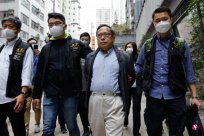(Hong Kong Comprehensive News) Hong Kong announced that it has entered a new stage of epidemic prevention and control. From January 30, it will cancel the isolation order of the crown disease diagnostic.
According to the press release of the Hong Kong Government News Network, Chief Executive Li Jiachao announced on Thursday (January 19) at the Legislative Council Q & A Conference that it will be revoked on January 30Management of the above respiratory disease.
Li Jiachao said that the vaccination rate of local crown diseases overlay the immunity caused by the large number of infections of the fifth wave of epidemic, which makes the effective vaccination rate of the third dose of vaccine is equivalent to 95 %.The patient's condition is also mild.
He pointed out that the people's cognition and treatment ability of coronary virus has been greatly improved. Therefore, it is believed that it is currently necessary to move towards the new stage and new model of treatment of the epidemic.Responsible by yourself.
Lu Chongmao, the director of the Hong Kong Medical and Health Bureau, announced at a press conference on the afternoon of the same day that from January 30, the citizens who are positive will no longer be declared through the online platform of the Health Protection Center.use.
Zhao Lejian, director of the Health Protection Center of the Department of Health, added that a small number of quarantine facilities will still be retained at that time for local citizens in need.The official will send health suggestions to the confirmed person, allowing asymptomatic infected people to go out freely, but it is not recommended to return to school with asymptomatic infections.
Xu Lejian also said that the cancellation of the after -arranging crown disease is still a legal infectious disease, but then the private doctor will only report serious and death cases, and the official will only release the number of nucleic acid testing positive and death cases.
Lu Chongmao emphasized that the decision to maintain public health emergency state shows that the government is adjusting epidemic prevention measures, rather than relaxing or abandoning, and the theory and policies have not conflicted.He pointed out that although the crown disease is similar to the flu, the communication, vaccine and drugs are different, and it cannot be simply treated as flu.
The latest announcement means that in addition to the mask order, Hong Kong has almost abandoned all other epidemic prevention restrictions.When asked when the mask allowed to cancel it, Lu Paimao bluntly stated that he didn't want to wear masks in daily life, but the mask was still an epidemic prevention tool that could effectively prevent respiratory infections.He hopes that the public will continue to adhere to this winter, and the official will consider making adjustments at an appropriate time.
Ming Pao reported this week that the unnamed sources reported that the Hong Kong government plans to revoke the mask order in March or April.The Hong Kong Government was ordered in July 2020 that it may be fined 5,000 Hong Kong dollars ($ 845) without a mask in public.
Li Jiachao: The startup plan will be promoted to Hong Kong around the world next month
On the other hand, Li Jiachao also proposed at the Q & A meeting that the number of travelers visiting Hong Kong will increase significantly with further relaxation of epidemic prevention measures. Except for next monthIn the first half of the year, a series of sports and cultural activities such as the Hong Kong Marathon, the International Seven Rugby Championship, the Hong Kong, and the Popular Culture and Art Festival will be held.He will also actively visit foreign visits and participate in business and cultural promotion activities to promote Hong Kong.
In customs clearance with the mainland, Li Jiachao pointed out that the risk of epidemic in the customs clearance has not increased since the 10 days of customs clearance, and the epidemic trend has moved down. From the maximum of nearly 30,000 positive cases a day, it has fallen to more than 3,000 cases.


